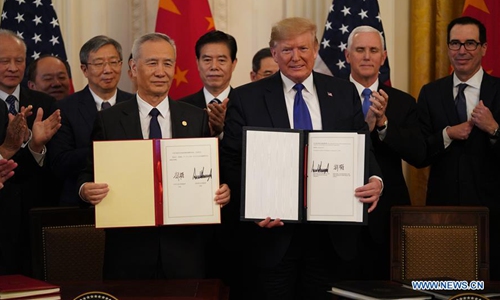Phase one trade deal eases frictions, phase two likely to encounter tougher bargaining

Chinese Vice Premier Liu He and US President Donald Trump show the signed China-US phase-one economic and trade agreement during a ceremony at the East Room of the White House in Washington D.C. on January 15. Photo: Xinhua
Since the US began to impose punitive tariffs on China in March 2018, China-US trade and economic relations have been significantly affected. According to China's General Administration of Customs, China's imports and exports to the US fell by 10.7 percent to 3.73 trillion yuan ($542 billion) in 2019.
However, after China and the US in December 2019 agreed to sign the phase one trade deal, China-US trade frictions, which have dragged on for more than two years, are easing, which prevents the possibility of a rapid decoupling of the world's two biggest economies in the near future.
While at its core, the signing of the phase one deal came from the joint efforts of both sides, China in particular showed its willingness to make substantial reforms in domains such as intellectual property, financial services, and technology transfer. It indicates China is fully aware of the significance of China-US relations and has realized it can take the opportunity to push forward market-based reforms, thus building a more mature and complete market economy system.
President Xi Jinping said there are "a thousand reasons to make the China-US relationship work, and no reason to break it." The negatives can be turned into positives if negotiations can tackle the frictions between China and the US in economy and trade, and facilitate China's domestic political and economic reforms.
From the perspective of Washington, the phase one deal is advantageous and vital. Although the US' overall economic clout is stronger than China's, and the US' position was more favorable, a full decoupling from the Chinese economy would tremendously undermine the US economy.
Any disruption to China-US trade ties will heavily hit US industries which rest on the Chinese market. In essence, the economy and trade of China and US are highly complementary. Launching a full-blown trade war would lead to lose-lose results. Other countries do not have the capacity to provide on a massive scale the imports the US needs, which are of decent quality and at a low price. In terms of China, if it loses the US market, it cannot find a similar international market in the short term. Decoupling between China and the US would be the worst scenario for both.
Nevertheless, although China and the US signed the phase one trade deal, a partial decoupling between the two countries is bound to happen, mainly in the high-tech realm. The US has concerns about the challenge from China's economic development on the US' hegemonic power position. As the world's factory, China is competitive in low-end and mid-end markets. If it catches up in high-tech, China will overtake the US sooner or later.
Furthermore, the high-tech sector involves national security implications. The US has defined China as its main strategic competitor. Blocking China from participating in its high-tech sector is pivotal to preventing China from gaining the capability to challenge the US. Therefore, Washington will impose a rising number of constraints in technological, educational and cultural exchanges between the two countries. Although a rapid decoupling between China and the US in trade is unlikely, China's investment in the US will be increasingly affected. Commodity flows will continue, but capital and technology flows will be restricted.
Compared with the phase one deal, negotiations on a phase two deal are bound to be more difficult. The phase one deal does not involve issues such as government subsidies and State-owned enterprises, which the US categorizes as unfair trade practices. The US is pushing for bilateral trade talks with relevant countries and Japan is promoting the Comprehensive and Progressive Agreement for Trans-Pacific Partnership, indicating Western countries are continuing their efforts in promoting an economic bloc under new rules. If agreements on the relations between governments and markets couldn't be reached between Western developed countries and immature market economies, a completely decouple between the two sides is still possible.
The author is a research fellow at the National Academy of Development and Strategy and a professor at the School of International Studies, Renmin University of China. opinion@globaltimes.com.cn
